I am a
student
institution
career professional
I need help with
Career Selection & Planning
Find your best-fit career, stream, course or college through advanced assessments and expert guidance.
college applications
Get admits from your dream colleges through end-to-end applications guidance for overseas and liberal arts universities.
I am interested in
Career Development Programs
State-of-the-art career assessments, expert guidance, and more to help students plan their career paths.
Career Advancement Programs
Expert-led MUN training programs, inspirational career talks and more to help students get that added edge.
I am interested in
Getting Certified (ICCC)
Become an International Certified Career Coach through a multi-level credentialing program by Mindler & CDA (USA).
Partnering with Mindler
Expand and grow your career counselling practice by leveraging the full force of Mindler’s career guidance platform.
Ready to discover your perfect career?
Enter your email id to take the Orientation Style test for free.
CAREER COUNSELLING PROGRAMS
Class 8-9
Stream & Subject SelectionAdvanced assessment & personalised guidance to help you select the perfect stream and subjects that align you to the right careers.
Class 10-12
Career Selection & PlanningExpert guidance & 5-dimensional assessment to help you discover your perfect career and choose the right course and college.
Graduates
Career Selection & Development5-dimensional assessment & superior guidance to help you discover your perfect career and choose the best next step.
Thank you for contacting us!
One of our team members will respond in 2 working days to resolve your query. If your query is urgent, you can alternatively call our career helpline.
Ready to pave your way to your dream college?
Leave your details below and we will get in touch shortly.
COLLEGE APPLICATION PROGRAMS
Overseas Application
End-to-end overseas admissions guidance to help you build the perfect applications for your target universities.
Liberal Arts Application
Comprehensive guidance and personalised application development for admissions to Liberal Arts programs.
Thank you for contacting us!
One of our team members will respond in 2 working days to resolve your query. If your query is urgent, you can alternatively call our career helpline.
Ready to give students the best of career guidance?
Leave your details below and we will get in touch shortly.
Career Development Programs
Career Development &
Planning Ecosystem
State-of-the-art assessment & end-to-end career guidance to help students discover their perfect career.
Thank you for contacting us!
One of our team members will respond in 2 working days to resolve your query. If your query is urgent, you can alternatively call our career helpline.
Ready to give your students the added edge?
Leave your details below and we will get in touch shortly.
Career Advancement Programs
MUN Training Program
Expert-led training and comprehensive guidance sessions to help students excel at MUN conferences.
Mindler Talks
Career awareness and inspirational talks for students with professionals who have achieved success in their fields.
Thank you for contacting us!
One of our team members will respond in 2 working days to resolve your query. If your query is urgent, you can alternatively call our career helpline.
Ready to upgrade your career counselling skills?
Enter your email id to start your ICCC application.
Getting Certified (ICCC)
International Certified
Career Coach (ICCC)
A 3-month program with emphasis on global practices, experiential learning & career guidance tools.
Thank you for contacting us!
One of our team members will respond in 2 working days to resolve your query. If your query is urgent, you can alternatively call our career helpline.
Ready to grow as a counsellor?
Leave your details below and we will get in touch shortly.
Partnering with Mindler
Mindler Partner Program
World-class career assessment platform & tools to help you scale up your career counselling practice.
Thank you for contacting us!
One of our team members will respond in 2 working days to resolve your query. If your query is urgent, you can alternatively call our career helpline.
Breaking News
- Ministry of Education and Sports Azerbaijan Government Scholarships For 2025-2026 Academic Year ...Read More
- Government Sponsorship Undergraduate Admission Lists 2025-26 for Makerere University ...Read More
- Ministry of Education And Sports: Egyptian Government Scholarships 2025-2026 Academic Year ...Read More
- Ground Breaker Full Scholarship for girls to study Software Engineering 2025 July Intake ...Read More
- Tony Elumelu Foundation Entrepreneurship Programme (TEEP) 2025 for young African Entrepreneurs ...Read More
- DESIGNING FUTURES 2050 International Design Competition 2025 (€15,000 prize) ...Read More
- Ground Breaker Full time Scholarship for girls to study Software Engineering 2025 Intake ...Read More
- Ministry of Education And Sports Algerian Vocational Training Scholarships for 2024-2025 AY ...Read More
- Ministry of Education and Sports Advert for the Algerian Government Scholarships for 2024-2025 ...Read More
- Uganda Dev Summit 2024 Live Stream ...Read More
Communications engineer
Communications engineers work within the broader field of electronic engineering and apply their knowledge of engineering principles to design solutions and advise management and other personnel on technical issues. They typically study, develop, design and maintain electronic systems and components for scientific, military, industrial or commercial use.
Add to FavouritesTheir duties can include project management and planning, making sure that projects are completed within deadlines and that they do not exceed budget, and that solutions they design meet the standards of quality and all the relevant safety regulations.
Skills
Communications engineers must have a high level of technical knowledge and good problem solving skills, as well as the ability to analyse complex systems and stay focused and organized when working on tight deadlines. They must be able to pick up new skills quickly because the technologies they use are constantly changing, and they must be able to work well in a team. Project management and leadership skills will become valuable after a few years working in the field.
Qualifications
Communications engineers typically enter the field with a degree in one of the following disciplines: communications engineering, computer science, information technology, telecommunications, electronic engineering, physics, or mathematics.
Work
Communications engineers can be employed in a diverse range of industries, including telecommunications, networking and computing technologies, radio and television. Their work can be technical in nature, or they can perform managerial tasks, depending on their area of specialty and choice of career path. A number of jobs in the field include both aspects, the technical work and organizational duties.
Engineers can work on designing electronic components with application in such fields as instruments and controls, aerospace, propulsion control, acoustics, or telecommunications. They will typically analyze system requirements, determine feasibility, evaluate and test operational systems, draft proposals, recommend system improvements and modifications, and develop procedures for testing electronic components, products and systems.
Communications engineers will usually be involved in site surveys, analysing data, testing prototypes and theoretical designs, and negotiation with vendors and clients. They will often travel to attend seminars and conferences to network and exchange information with experts in related disciplines. Their responsibilities usually also include resource management, preparing reports for clients and management, attending briefings to discuss new projects, setting budgets, and managing staff.
-
 Malyasian Government Scholaship Under Malyasian Technical Cooperation Program
Full Scholarship to study in Malyasia
Malyasian Government Scholaship Under Malyasian Technical Cooperation Program
Full Scholarship to study in Malyasia
Know more -
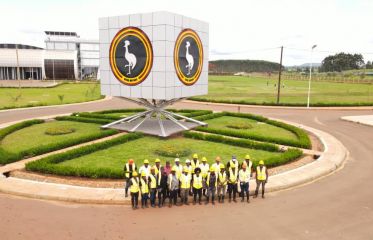 Graduate Intern - Information Systems Engineering (2 Positions)
Kiira Motors Corporation Invites Applications from Resourceful, Qualified and Passionate Individuals
Graduate Intern - Information Systems Engineering (2 Positions)
Kiira Motors Corporation Invites Applications from Resourceful, Qualified and Passionate Individuals
Know more -
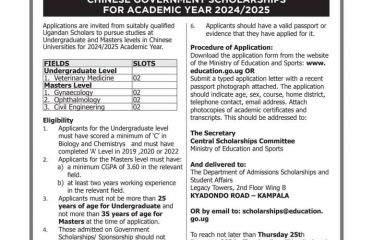 Ministry of Education And Sports Chinese Government Scholarships for Academic Year 2024-2025
Applications are invited from suitably qualified Ugandan Scholars to pursue studies at Undergraduate and Masters levels in Chinese Universities for 2024/2025 Academic Year
Ministry of Education And Sports Chinese Government Scholarships for Academic Year 2024-2025
Applications are invited from suitably qualified Ugandan Scholars to pursue studies at Undergraduate and Masters levels in Chinese Universities for 2024/2025 Academic Year
Know more -
Egypt Japan University of Science and Technology TICAD8 Postgraduate Scholarship Program 2024
TICAD8 Scholarships to develop high quality human resources in the field of STI (Science, Technology and Innovation) toward future African STI network and beyond
Know more -
Qualcomm Make in Africa Startup Mentorship Program
Mentorship Program for Start Ups in Hardware Development
Know more -
Information on Public Universities Admissions for 2024-2025 Academic Year (JAB Booklet 2024-2025)
The application for placement of students to Public Universities is to be completed by Senior Six Leavers
Know more -
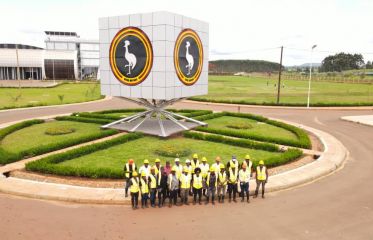 Employment Opportunities at Kiira Motors Corporation
Kiira Motors Corporation Invites Applications from Resourceful, Qualified and Passionate Individuals
Employment Opportunities at Kiira Motors Corporation
Kiira Motors Corporation Invites Applications from Resourceful, Qualified and Passionate Individuals
Know more -
Apply for the Kiira Motors 2 Year Graduate Internship Program
Hon your skills with Uganda's Leading Car Manufacturer
Know more -
National Science Week 2023 Live Stream
Find your guiding inspiration in the place where dream are made
Know more -
The Student Hub introduces Coding and Graphics Designing Classes for Vacists
Hone your craft in trending 21st century skills
Know more -
 Call for applications for African Climate Mobility Youth Solutions (Win $5000)
Climate mobility, climate-induced migration and forced displacement, is growing concern in Africa
Call for applications for African Climate Mobility Youth Solutions (Win $5000)
Climate mobility, climate-induced migration and forced displacement, is growing concern in Africa
Know more -
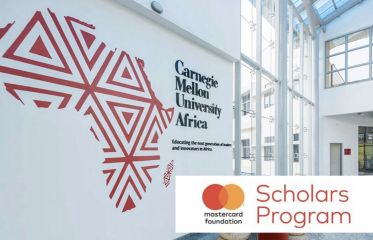 Carnegie Mellon University Africa Mastercard Scholarships Programs 2024 for young Africans
CMU-Africa and the Mastercard Foundation have partnered to support students whose talent and promise exceed their financial resources.
Carnegie Mellon University Africa Mastercard Scholarships Programs 2024 for young Africans
CMU-Africa and the Mastercard Foundation have partnered to support students whose talent and promise exceed their financial resources.
Know more -
 Sciences Po Mastercard Foundation Scholars Program 2024-2025 for graduate study in France
Students receive the scholarships and financial aid throughout the two years of their Master’s programme
Sciences Po Mastercard Foundation Scholars Program 2024-2025 for graduate study in France
Students receive the scholarships and financial aid throughout the two years of their Master’s programme
Know more -
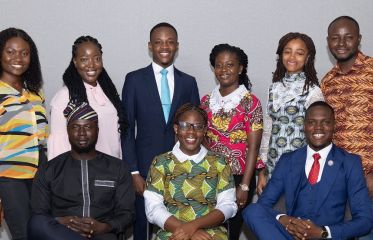 McGill University MasterCard Scholars Program 2024 for Study in Canada (Fully Funded)
The Scholars Program strives to select academically talented young leaders from Sub-Saharan Africa to access a world-class university education
McGill University MasterCard Scholars Program 2024 for Study in Canada (Fully Funded)
The Scholars Program strives to select academically talented young leaders from Sub-Saharan Africa to access a world-class university education
Know more -
 AIMS African Masters of Medicine Intelligence (AMMI) Graduate Program 2023-2024 (Fully Funded)
A program prepare to prepare well rounded Machine Intelligence (MI) researchers
AIMS African Masters of Medicine Intelligence (AMMI) Graduate Program 2023-2024 (Fully Funded)
A program prepare to prepare well rounded Machine Intelligence (MI) researchers
Know more -
Open GIS Academy Launches GIS Course for M&E; personnel
2 Months Instructor Led Course
Know more -
WAAW Foundation Scholarship for Female University STEM Students
Scholarship for female college students in Africa to pursue their studies in a STEM-related course
Know more -
Coca Cola Beverage Africa graduate Training Program 2023
Should have a First-class or Second-class Upper university degree completed between 2021 and 2023
Know more -
University of Cape Town MasterCard Foundation Scholars Program 2023-2024 (Fully Funded)
Fully Funded Scholarships to study in South Africa
Know more -
Kyambogo University Government Sponsorship Admissions Lists 2023-2024
Candidates admitted to the respective courses tenable at Kyambogo University
Know more -
Internship and Graduate Trainee Opportunities at Total Uganda
Start your Career With Total Uganda
Know more -
Indian Government Scholarships 2023-2024
PhD , Masters and Undergraduate Scholarships
Know more -
Ingressive for Good (14G) DataCamp Scholarships 2023 for young Africans
Scholarship to hone Data Science Skills
Know more -
AI for Science Master’s program at AIMS South Africa 2023 for African Students
Full Scholarship to Study Artificial Intelligence
Know more -
Call for applications for CNOOC Welders Training and Certification Program
Free train in 3G and 6G welding
Know more -
Swedish Institute Scholarships for Global Professional (SISGP) 2023-2024 for Master's Level Studies in Sweden (Fully Funded)
The SI Scholarship for Global Professionals aims to develop future global leaders that will contribute to the United Nations 2030 Agenda for Sustainable Development and to sustainable development
Know more -
Fashionomics Africa Online Masterclasses Incubator And Accelerator Programs Call for Application
Entrepreneurs will be coached and mentored in an interactive and tailored two-week training to review, prepare and present their businesses for capital raising from investors.
Know more -
Next Einstein Forum (NEF) Young Ambassador Programme 2022-2024 for young African
The Next Einstein Forum (NEF) is excited to announce a call for applications for its new cohort of NEF Ambassadors (2022-2024)
Know more -
American University of Beirut MasterCard Foundation Scholarship Program 2023-2024 for Sub-Saharan African Students
The American University of Beirut (AUB) offers full scholarships for graduate education in partnership with the Mastercard Foundation
Know more -
Virtual Factory Network Relief Fund for Artisans (Win Up to 10 Million UGX)
Enabling business growth through empowering, strengthening and transitioning cottage industry entrepreneurs
Know more -
 Employment Opportunities at Sinopec International Petroleum Services
Sinopec is looking for experienced professionals who have 5 or more years of relevant experience and recognized expertise in large onshore/ offshore oil and gas EPC projects
Employment Opportunities at Sinopec International Petroleum Services
Sinopec is looking for experienced professionals who have 5 or more years of relevant experience and recognized expertise in large onshore/ offshore oil and gas EPC projects
Know more -
Uganda Development Bank Graduate Apprenticeship Program 2022
Uganda Development Bank Ltd seeks to recruit Brilliant young Graduates from reputable Universities/Colleges
Know more -
The Schlumberger Foundation is accepting new applications for the 2023–2024 Faculty for the Future Fellowships
Fellowships for women in STEM
Know more -
Total Graduate Trainees opportunities 2022 Work opportunities at Total Energies
Know more -
Call for applications for the IEEE Continued Program
Online Courses from the Institute of Electrical and Electronics Engineers
Know more -
Call for Applications for ICT Founders Training Program by The Ministry of ICT and National Guidance
ICT Founder Business Training Program
Know more -
 Ministry of Education and Sports Indian Government Scholarships for 2022-2023 Academic Year
Master and Undergraduate Scholarships in India
Ministry of Education and Sports Indian Government Scholarships for 2022-2023 Academic Year
Master and Undergraduate Scholarships in India
Know more -
 KCB Bank -Giz Full Tuition Scholarship Cohort 2
KCB Bank Uganda, in partnership with GIZ E4D, is offering full-tuition scholarships
KCB Bank -Giz Full Tuition Scholarship Cohort 2
KCB Bank Uganda, in partnership with GIZ E4D, is offering full-tuition scholarships
Know more -
Swedish AI Fund (SAIF) for early stage African AI Companies
Swedish AI Fund (SAIF) aims to help Early Stage African AI Companies
Know more -
Google Solutions Challenge 2022 for University Students Around the World
The mission of the 2022 Solution Challenge is to solve for one or more of the United Nations 17 Sustainable Development Goals using Google technology.
Know more -
Society of Petroleum Engineers (SPE) Imomoh Scholarship 2022-2023 for African Students
Scholarship opportunity for Masters Students
Know more -
Applications are now open for MEST Africa’s 12-month Training Program for Class of 2023
After School Entrepreneurship Training Program
Know more -
Microsoft Imagine Cup Junior 2022: A Global Challenge for Secondary School Students
An exciting opportunity for students to learn about technology and how it can be used to solve some of the world’s biggest challenges
Know more -
African Coding Network 2022 Scholarships for African Women in Technology
Learn the skills that will help you get to where you want to be
Know more -
TotalEnergies launches online training course to skill Ugandans in Oil and Gas
Shaping the Oil Industry
Know more -
KCB Uganda GIZ Youth Upskilling Program 2022 (Full Scholarship)
Full Scholarship in mansory ,plumbing, welding, carpentry and electrical installations
Know more -
UNICEF Uganda Innovation Fund Challenge Cohort 2 for Innovators
Receive Grants Funding of up to 80 Million Shillings
Know more -
Call for Applications for African SMEs in the Blue Economy
Pitch your blue economy project during the BlueInvest Africa 2022 event!
Know more -
EPFL School of Life Sciences Summer Research Program
Experience what it means to be part of the thriving science community in Switzerland
Know more -
Apply for the African Women in Data Scholarship
Hon your skills in Data Science with this full scholarship
Know more -
Quantitative Data Literacy Training Cohort III
Hon your skills in Data Science
Know more -
Generation Google Scholarship (7,000 EUR) for women in computer science for 2022-2023 academic year
Scholarship to inspire women scientists excel in technology
Know more -
Young water fellowship programme (YWF) 2021 for early-stage Ugandan Social Entrepreneurs
(YWF) Uganda 2021 is an entrepreneurship programme dedicated to social businesses in the water, sanitation and hygiene sector
Know more -
Meet Winnie Nalubowa; Uganda’s female rocket scientist
She Graduated with a First Class In Bachelors Degree in Aircraft and Rocket Engineering
Know more -
The Africa Prize for Engineering Innovations, Win £ 25,000
Advance Your Engineering Innovation with the Royal Academy of Engineering
Know more -
Meet the three students who won the 2020 Micro Grid Academy Young Talent of the Year Award
Women at the fore-front of renewable energy in Uganda
Know more -
Apply for the Girl Up Scholarship Fund (Fully Funded)
Fully Funded Scholarship to study at a University of your Choice
Know more -
Total Full Masters Scholarship at the International French Petroleum Institute for 2021 intake
Full Scholarship at the International French Petroleum Institute (IFP)
Know more -
Full Tuition and Functional Fees Scholarships at Makerere University 2021-2022 Academic Year
Bright Female Students Scholarships
Know more -
Call for applications at Uganda Petroleum Insititute Kigumba
80% scholarship in Oil and Gas Industry
Know more -
Scholarships for International technical certificates in Oil and Gas in Uganda
80% Government Scholarship in Oil and Gas
Know more -
African Institute for Mathematical Sciences (AIMS) 2021 Master's Scholarships (Fully Funded)
Fully Funded Scholarship to advance your career in Mathematical Sciences
Know more -
The Lester B. Pearson International Student Scholarships At University of Toronto Canada 2020-2021
Study in Canada for Free
Know more -
African Leadership University Refugee Scholarship 2020 (Fully Funded)
Empowering refugees to access quality education
Know more -
African Disability Scholarship at African Leadership University 2020(Fully Funded)
Disabled Students scholarship to African Leadership University
Know more -
United Nations Environment Programme(UNEP) Young Champions of Earth 2020
Become a young champion of Earth
Know more -
Study in New Zealand on a full scholarship 2020-2021 (Fullly Funded)
Attain world class tertiary and vocational education in New Zealand
Know more -
 GHC Scholarships for Women Technologists to attend Grace Hopper Celebration 2020 in USA
Get Scholarship to attend Grace Hopper Fellowship
GHC Scholarships for Women Technologists to attend Grace Hopper Celebration 2020 in USA
Get Scholarship to attend Grace Hopper Fellowship
Know more -
The Egypt Japan University of Science and Technology 2020 Scholarship
Study in a world's leading University
Know more -
MAURITIUS – AFRICA SCHOLARSHIP SCHEME 2020 CALL FOR APPLICATIONS
Get an international Education while studying in Mauritius
Know more -
Makerere University Students win 300 million climate change grant
The team designed a water filtration technology code-named Vepox Filter
Know more -
Sciences Po Mastercard Foundation Scholars Program 2020-2021 for study in France
Fully Funded Scholarship to study in France
Know more -
Japan Africa Dream Scholarship Program 2020 for young Africans to study in Japan (Fully Funded)
Get World Class Education in Japan
Know more -
MasterCard Foundation Scholars Program 2020 at McGill University in Canada (Fully Funded)
Study in Canada
Know more -
Ndejje University introduces degree in sports medicine
Bachelor’s degree in sports medicine starts in January 2020
Know more -
Apply for the WAAW Foundation STEM scholarships for female students 2019-2020
Promoting Africa's STEM Girls
Know more -
Apply for the Chevening UK Government full Scholarship to Study in the UK 2020-2021
Unique opportunity for future leaders to study in UK
Know more -
Girls soar in science innovations
Inspiring girls to pursue science majors
Know more -
Senior six dropout beats all odds to become a fighter jet pilot
East Africa’s best military aircraft pilot in the making
Know more -
Makerere defeats top USA University at a world technology exhibition
Innovations for a Resilient Africa
Know more -
Graduate Engineer develops Boda Boda Tracking System
The telecom engineering graduate wants to help owners track stolen bikes
Know more -
Meet lynette kebirungi uganda's 2nd female aerospace engineer
The second Ugandan female Aerospace Engineer
Know more -
Makerere reverts to steam engine for more energy
Using steam to generate power
Know more -
A Moment with University Students who developed a Bio gas Powered TriCycle
Uganda's Winners from the Thought for Food Global
Know more -
Kayoola the solar powered bus finally unveiled
A Brain Child of Makerere University
Know more -
Girl who made bricks for fees graduates
The far one can go to achieve the dream
Know more -
Makerere to scrap courses with few students
Courses with less graduates to be affected
Know more -
Makerere produces home-made tractor
Makerere University championing innovation in the
Know more -
Female students in Uganda develope a Gynecology App
Female Engineers rising up to the challenge
Know more -
Makerere students develop breast cancer detecting technology
The Story of three innovative Makerere Students
Know more -
Samsung to Introduce Solar powered internet school
Dawn of a new day for Ugandan Students
Know more -
Matibabu: A bloodless way to test for Malaria
The Story of Ugandan Innovators
Know more -
Uganda Engineer modified the Boeing 787 Dreamliner
The Story of Uganda's Aeronautics Engineer
Know more
Draw Inspiration from time tested individuals
-
 Meet Betty Mirembe, the First President of the Machine Learning Club at Makerere University
Meet Betty Mirembe, the First President of the Machine Learning Club at Makerere University
Watch Interview -
Catching up with Ramadan Kisambira, the Operations and Maintenace Field Engineer at Africell Uganda
Watch Interview
Careers that are in the same career field as Communications engineer
- Industrial Chemist Know more
- Project Engineer Know more
- Service engineer Know more
- Chemical engineer Know more
- Broadcast engineer Know more
- Biomedical engineer Know more
- Automotive engineer Know more
- Research and development manager Know more
- Power engineer Know more
- Petroleum engineer Know more
- Network engineer Know more
- Mechanical engineer Know more
- Agricultural engineer Know more
- Communications engineer Know more
- Food engineer Know more
- Systems engineer Know more
- Sound engineer Know more
- Solar engineer Know more
- Statistician Know more
- Mathematician Know more
- Geological and Petroleum Technician Know more
- Geophysical Data Technician Know more
- Forensic Science Technician Know more
- Architectural and Engineering Manager Know more
- Biofuels,Biodiesel Technology and Product Development Manager Know more
- Mathematician Know more
- Statistician Know more
- Biostatistician Know more
- Clinical Data Manager Know more
- Mathematical Technician Know more
- Cartographer and Photogrammetrist Know more
- Aerospace Engineer Know more
- Computer Hardware Engineer Know more
- Electrical Engineer Know more
- Electronics Engineers, Except Computer Know more
- Radio Frequency Identification Device Specialist Know more
- Health and Safety Engineer, Except Mining Safety Engineer and Inspector Know more
- Industrial Safety and Health Engineer Know more
- Fire-Prevention and Protection Engineer Know more
- Product Safety Engineer Know more
- Industrial Engineer Know more
- Human Factors Engineer and Ergonomist Know more
- Marine Engineers and Naval Architect Know more
- Marine Engineer Know more
- Marine Architect Know more
- Materials Engineer Know more
- Mechanical Engineer Know more
- Fuel Cell Engineer Know more
- Automotive Engineer Know more
- Mining and Geological Engineer, Including Mining Safety Engineer Know more
- Nuclear Engineer Know more
- Petroleum Engineer Know more
- Biochemical Engineer Know more
- Validation Engineer Know more
- Energy Engineer Know more
- Manufacturing Engineer Know more
- Mechatronics Engineer Know more
- Microsystems Engineer Know more
- Photonics Engineer Know more
- Robotics Engineer Know more
- Nanosystems Engineer Know more
- Wind Energy Engineer Know more
- Solar Energy Systems Engineer Know more
- Biologist Know more
- Biochemists and Biophysicist Know more
- Zoologists and Wildlife Biologist Know more
- Bioinformatics Scientist Know more
- Molecular and Cellular Biologist Know more
- Geneticist Know more
- Conservation Scientist Know more
- Soil and Water Conservationist Know more
- Range Manager Know more
- Medical Scientists, Except Epidemiologist Know more
- Astronomer Know more
- Physicist Know more
- Atmospheric and Space Scientist Know more
- Chemist Know more
- Materials Scientist Know more
- Environmental Scientists and Specialist, Including Health Know more
- Climate Change Analyst Know more
- Environmental Restoration Planner Know more
- Industrial Ecologist Know more
- Geoscientist, Except Hydrologist and Geographer Know more
- Hydrologist Know more
- Remote Sensing Scientist and Technologist Know more
- Economist Know more
- Environmental Economist Know more
- Neuropsychologist and Clinical Neuropsychologist Know more
- Urban and Regional Planner Know more
- Anthropologist and Archeologist Know more
- Anthropologist Know more
- Archeologist Know more
- Geographer Know more
- Historian Know more
- Political Scientist Know more
- Nuclear Monitoring Technician Know more
- Social Science Research Assistant Know more
- Forest and Conservation Technician Know more
- Quality Control Analyst Know more
- Precision Agriculture Technician Know more
- Telecommunications Equipment Installer and Repairer, Except Line Installer Know more
- Electric Motor, Power Tool, and Related Repairer Know more
- Data Scientist Know more
Online Training in Science, Technology, Engineering and Mathematics
Trending Opportunities
Latest Jobs Corner
-
Finance Officer Jobs – Pride Bank
Posted: Posted Fri, 08 Aug 2025 15:09:33 +0000 -
Credit Supervisor Monitoring & Reporting Jobs – Pride Bank
Posted: Posted Fri, 08 Aug 2025 15:09:23 +0000 -
Hard Collections Call Center Supervisor Jobs – MOGO Uganda
Posted: Posted Fri, 08 Aug 2025 15:09:14 +0000 -
Commercial Director Jobs – Uganda Breweries
Posted: Posted Fri, 08 Aug 2025 15:08:57 +0000 -
Confirmed Geologist (Oil and Gas Jobs) Jobs – TotalEnergies Uganda
Posted: Posted Fri, 08 Aug 2025 15:08:49 +0000 -
Well Superintendent(Oil and Gas Jobs) Jobs – TotalEnergies Uganda
Posted: Posted Fri, 08 Aug 2025 15:08:33 +0000 -
Tech Sales Specialist Jobs – Nile Breweries
Posted: Posted Fri, 08 Aug 2025 15:08:25 +0000 -
Brewing Operator (Fresher Jobs) Jobs – Nile Breweries
Posted: Posted Fri, 08 Aug 2025 15:08:17 +0000 -
Driver Jobs – HR Beyond Limits
Posted: Posted Fri, 08 Aug 2025 15:08:09 +0000 -
Purchasing Officer (Fresher Jobs) Jobs – Paper Toils
Posted: Posted Fri, 08 Aug 2025 15:08:01 +0000
Advertisement
Trending Opportunities
Advertisement
Popular Careers
-
Civil Engineer
28055 Views -
Actor
22230 Views -
Flight attendant
20232 Views -
Fashion Designer
19190 Views -
Pilot and flight engineer
17375 Views
























